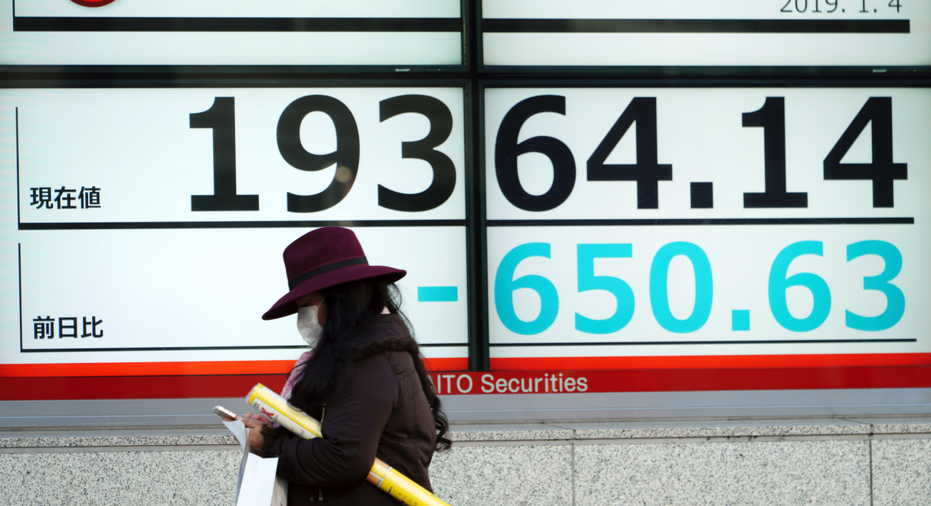Japanese shares skid, Shanghai surges after Wall St sell-off
A woman walks past an electronic stock board showing Japan's Nikkei 225 index at a securities firm in Tokyo Friday, Jan. 4, 2019. Japanese markets have tumbled as they reopened after the New Year holidays, while other Asian indexes are mixed after a technology-led sell-off on Wall Street. (AP Photo/Eugene Hoshiko)
SINGAPORE – Japanese shares tumbled and Shanghai's benchmark surged Friday as Asian markets steadied following a technology-led sell-off on Wall Street.
The Nikkei 225 index started its first trading day of 2019 by falling more than 3 percent. By midday, it was trading 2.8 percent lower at 19,465.36 as technology and electronics makers slumped.
But Hong Kong's Hang Seng jumped 1.3 percent to 25,380.37. The Shanghai Composite rebounded 1.8 percent to 2,509.02.
Traders cheered a private survey released Friday showing that China's services sector expanded in December. China's Caixin Services PMI, a survey of service industry purchasing managers, had a reading of 53.9 in December, a six-month high. This was slightly higher than November's reading of 53.8. The survey comes on the back of weak manufacturing data earlier in the week.
Investors also were encouraged by news that the U.S. and China will hold trade talks in Beijing on Jan. 7 and 8. The U.S. delegation will be led by Deputy U.S. Trade Representative Jeffrey Gerrish, a Commerce Ministry statement said Friday.
U.S. shares fell after Apple CEO Tim Cook told shareholders after markets closed Wednesday that Chinese iPhone sales were slipping. Cook said the company expects revenue of $84 billion in the last quarter of 2018, $7 billion less than analysts had forecast.
Apple's report startled investors who fear a slowdown of the world's second largest economy amid pressure from a trade dispute between Washington and Beijing.
The broad S&P 500 index gave up 2.5 percent to 2,447.89 and the Dow Jones Industrial Average lost 2.8 percent to 22,868.22. The Nasdaq composite, which has a high concentration of tech stocks, declined 3 percent to 6,463.50.
A report suggesting that U.S. manufacturing had slowed also weighed on sentiment. IHS Markit's U.S. manufacturing purchasing managers' index was 53.8 in December, the lowest reading in more than two years, and down from 55.3 in the previous month. The index is on a 100-point scale, with 50 separating contraction from growth.
"Concerns on global growth intensified," Zhu Huani of Mizuho Bank said in a commentary. "As growths in China and Eurozone have been clearly slowing, investor fears that moderating global demand will start to dampen U.S. growth momentum," she added.
On Friday, South Korea's Kospi, which has a high number of technology stocks, added 0.5 percent to 2,003.99. Australia's S&P-ASX 200 shed 0.6 percent to 5,600.10. Shares fell in Taiwan and Thailand, but rose in Singapore, Malaysia, Indonesia and the Philippines.
The rebound in equities suggests that "Asian investors shrugged off bearish news surrounding Apple, and took this as a buying opportunity as the valuation of (Shanghai, Hong Kong and Singapore) markets are close to four-year lows," Margaret Yang, market analyst at CMC Markets, said in an interview.
In other trading, U.S. crude oil added 17 cents to $47.26 per barrel in electronic trading on the New York Mercantile Exchange. The contract rose 55 cents to $47.09 per barrel on Thursday.
Brent crude, used to price international oils, rose 11 cents to $56.06 per barrel. It gained $1.04 to $55.95 per barrel in London.
The dollar strengthened to 108.37 yen from 107.67 yen. The euro slipped to $1.1393 from $1.1394.
___
AP Markets Writer Marley Jay in New York contributed.





















